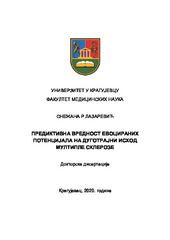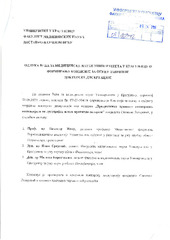Приказ основних података о дисертацији
Prediktivna vrednost evociranih potencijala na dugotrajni ishod multiple skleroze
Predictive value of evoked potentials on the long-term outcome of multiple sclerosis
| dc.contributor.advisor | Miletić Drakulić, Svetlana | |
| dc.contributor.other | Ilić, Tihomir | |
| dc.contributor.other | Srejović, Ivan | |
| dc.contributor.other | Borovčanin, Milica | |
| dc.creator | Simović, Snežana | |
| dc.date.accessioned | 2021-04-19T09:37:38Z | |
| dc.date.available | 2021-04-19T09:37:38Z | |
| dc.date.issued | 2021-03-11 | |
| dc.identifier.uri | http://eteze.kg.ac.rs/application/showtheses?thesesId=8022 | |
| dc.identifier.uri | https://fedorakg.kg.ac.rs/fedora/get/o:1335/bdef:Content/download | |
| dc.identifier.uri | https://nardus.mpn.gov.rs/handle/123456789/18247 | |
| dc.description | SAŽETAK Uvod: Cilj je bio da ispitamo prediktivnu vrednost evociranih potencijala (EP) na dostizanje povoljnog ishoda dugogodišnjeg lečenja imunomodulatornom terapijom obolelih od relapsno-remitentne multiple skleroze (RRMS), da procenimo značaj EP kao pokazatelja kognitivnog oštećenja, i uticaj depresije i zamora na EP i ishod lečenja. Metodologija: U retro- i prospektivnom istraživanju oboleli su praćeni tokom 2, 5 ili 10 godina. Na početku praćenja su rađeni vizuelni evocirani potencijali (VEP) i kognitivni EP (ERP), takođe i nakon dugogodišnjeg praćenja. Dobijeni su podaci o optičkom neuritisu (ON), procenjeni stepen onesposobljenosti, kognitivne funkcije, stepen depresivnosti i zamora, rađena magnetna rezonanca (MR) endokranijuma. Povoljan ishod lečenja predstavlja dostizanje NEDA-3 (No Evidence of Disease Activity). Rezultati: Učestvovalo je 112 sobolelih od RRMS i 32 zdrave kontrole. NEDA-3 je dostiglo 19 (22,9%), a nije dostiglo 64 (77,1%) lečenih od RRMS. Nalaz EP skora (r=0,008, OR=0,344 (0,156–0,757)) i latence (r=0,042, OR=0,966 (0,934–0,999)) na početku bolesti su prediktivni faktori na dostizanje NEDA-3. Depresija utiče na kognitivno oštećenje (r=0,047, OR=1,077 (1,001–1,159)) i povećanje onesposobljenosti (r=0,002, OR=1,143 (1,051–1,243)). Depresija i zamor negativno utiču na kognitivne funkcije, a ne utiču na amplitude i latence ERP. Reakciono vreme pozitivno korelira sa depresijom (r=0,246, p=0,01) i zamorom (r=0,281, p=0,01). Zaključak: Uredan VEP na početku bolesti uvećava šansu za dostizanje NEDA-3 oko 6 puta. Depresija utiče na povećanje onesposobljenosti i kognitivno oštećenje. Depresija i zamor negativno utiču na kognitivne funkcije, a ne utiču na amplitudu i latencu ERP. ERP ne mogu učestvovati u proceni kognitivnog oštećenja obolelih od RRMS. | sr |
| dc.description | ABSTRACT Objective: The study examined predictive value of evoked potentials (EP) to achieve a outcome of long-term treatment of patients with relapsing-remitting multiple sclerosis (RRMS) with first-line immunomodulatory therapy, to assess EP as an indicator of cognitive impairment, and impact of depression and fatigue on EP and the outcome of treatment. Method: In retrospective and prospective study patients were followed for 2, 5 or 10years. At the diagnosis visual evoked potentials (VEP) and event-related potentials (ERP) were done, also after follow-up period. Each patient was assigned a degree of disability – EDSS (Expanded Disability Status Scale), cognitive functions, degree of depression and fatigue, MRI of the endocranium. Favourable outcome is achieving NEDA-3 (No Evidence of Disease Activity). Results: A total of 112 patients with RRMS and 32 healthy controls participated. NEDA-3 reached 19 (22,9%) and did not 64 (77,1%) treated patients. We found that the VEP score (р=0,008, OR=0,344 (0,156–0,757)) and latency (r=0,042, OR=0,966 (0,934–0,999)) at diagnosis were predictive factors to achieve NEDA-3. Depression affects cognitive impairment (r=0,047, OR=1,077 (1,001-1,159)) and increases future disability (r=0,002, OR=1,143 (1,051-1,243)). Depression and fatigue negatively affected cognitive functions, and did not affect the ERP. Reaction time (RT) positively correlated with depression (r=0,246, p=0,01) and fatigue (r =0,281, p=0,01). Conclusions: Normal EP findings at diagnosis are 6 times more likely to achieve NEDA. Depression affects disability and cognitive impairment. Depression and fatigue have a negative impact on cognitive functions, and have no effect on ERP. Amplitude and latency cannot participate in risk assessment for the cognitive impairment in patients with RRMS. | en |
| dc.format | application/pdf | |
| dc.language | sr | |
| dc.publisher | Универзитет у Крагујевцу, Факултет медицинских наука | sr |
| dc.rights | openAccess | en |
| dc.rights.uri | https://creativecommons.org/licenses/by-nc-nd/4.0/ | |
| dc.source | Универзитет у Крагујевцу | sr |
| dc.subject | multipla skleroza | sr |
| dc.subject | multiple sclerosis | en |
| dc.subject | evoked potentials | en |
| dc.subject | depression | en |
| dc.subject | fatigue | en |
| dc.subject | cognitive impairment | en |
| dc.subject | optic neuritis | en |
| dc.subject | NEDA | en |
| dc.subject | evocirani potencijali | sr |
| dc.subject | depresija | sr |
| dc.subject | zamor | sr |
| dc.subject | kognitivno oštećenje | sr |
| dc.subject | optički neuritis | sr |
| dc.subject | NEDA | sr |
| dc.title | Prediktivna vrednost evociranih potencijala na dugotrajni ishod multiple skleroze | sr |
| dc.title.alternative | Predictive value of evoked potentials on the long-term outcome of multiple sclerosis | en |
| dc.type | PhD thesis | |
| dc.rights.license | BY-NC-ND | |
| dcterms.abstract | Милетић Дракулић, Светлана; Илић, Тихомир; Боровчанин, Милица; Срејовић, Иван; Симовић, Снежана; Предиктивна вредност евоцираних потенцијала на дуготрајни исход мултипле склерозе; Предиктивна вредност евоцираних потенцијала на дуготрајни исход мултипле склерозе; | |
| dc.identifier.fulltext | https://nardus.mpn.gov.rs/bitstream/id/70998/Izvestaj_Snezana_Lazarevic_Simovic_Medicina.pdf | |
| dc.identifier.fulltext | https://nardus.mpn.gov.rs/bitstream/id/70997/Disertacija.pdf | |
| dc.identifier.rcub | https://hdl.handle.net/21.15107/rcub_nardus_18247 |



